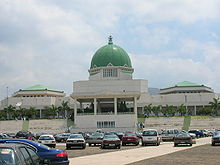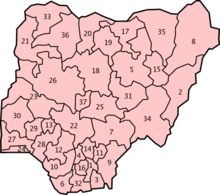- National Assembly of Nigeria
-
National Assembly of Nigeria Type Type Bicameral Houses Senate
House of RepresentativesLeadership President of the Senate David Mark, (PDP)
since 06 June 2007Speaker of the House Aminu Waziri Tambuwal, (PDP)
since 06 June 2011Meeting place 
National Assembly Building Website http://www.nass.gov.ng/ Nigeria 
This article is part of the series:
Politics and government of
Nigeria- Constitution
- President (List)
- Vice-President
- Cabinet
- Federal Parastatals
- National Assembly
- Supreme Court
- States
- Zones
- Elections
- Political parties
- Foreign relations
- Human rights
The National Assembly of the Federal Republic of Nigeria is a bicameral legislature established under section 4 of the Nigerian Constitution. It consists of a Senate and a 360-member House of Representatives. The body, modelled after the federal Congress of the United States, is supposed to guarantee equal representation of the states irrespective of size in the Senate and proportional representation of population in the House. The National Assembly, like many other organs of the Nigerian government, is based in the federal capital Abuja.
Contents
Leadership
The Senate is chaired by the President of the Nigerian Senate, the first of whom was Nnamdi Azikiwe, who stepped down from the job to become the country's first Head of State. The House is chaired by the Speaker of the House of Representatives. At any joint session of the Assembly, the President of the Senate presides and in his absence the Speaker of the House presides.
OFFICE NAME TERM President of the Senate David Mark 06 June 2007–present Speaker of the House of Representatives Aminu Waziri Tambuwal 06 June 2011–present Functions
The Assembly has broad oversight functions and is empowered to establish committees of its members to scrutinise bills and the conduct of government officials. Since the restoration of democratic rule in 1999, the Assembly has been said to be a "learning process" that has witnessed the election and removal of several Presidents of the Senate, allegations of corruption, slow passage of private member's bills and the creation of ineffective committees to satisfy numerous interests.
In spite of a more than two-thirds majority control of the Assembly by the ruling People's Democratic Party (PDP), the PDP government led by Alhaji Umaru Musa Yar'Adua and the Assembly have been known more for their disagreements than for their cooperation. President Yar'Adua has been accused of being slow to implement policy. Many bills, some from as long ago as 2007, are still awaiting the President's assent. While the Assembly has made strong and often popular efforts to assert its authority and independence against the executive, it is still viewed generally in a negative light by the media and many of the Nigerian people. The Assembly sits for a period of at most four years, after which time the President is required to dissolve it and call a new Assembly into session.
The Senate has the unique power of impeachment of judges and other high officials of the executive including the Federal Auditor-General and the members of the electoral and revenue commissions. This power is, however, subject to prior request by the President. The Senate also confirms the President's nomination of senior diplomats, members of the federal cabinet, federal judicial appointments and independent federal commissions.
Before any bill may become law, it must be agreed to by both the House and the Senate, and receive the President's assent. Should the President delay or refuse assent (veto) the bill, the Assembly may pass the law by two-thirds of both chambers and overrule the veto and the President's consent will not be required. The present Assembly has not hidden its preparedness to overrule the executive where they disagree.[1]
National Assembly State Delegations
See also
- Nigerian First Republic (1963-1966)
- Nigerian Second Republic (1979-1983)
- Nigerian Third Republic (1993)
- Nigerian Fourth Republic (1999-present)
- Elections in Nigeria
References
- ^ Policy and Legal Advocacy Centre
External links
- Official website of the Nigerian National Assembly
- Assemblyonline news on the National Assembly
- Official People and Legislature Information Interchange
Abia • Adamawa • Akwa Ibom • Anambra • Bauchi • Bayelsa • Benue • Borno • Cross River • Delta • Ebonyi • Edo • Ekiti • Enugu • Gombe • Imo • Jigawa • Kaduna • Kano • Katsina • Kebbi • Kogi • Kwara • Lagos • Nasarawa • Niger • Ogun • Ondo • Osun • Oyo • Plateau • Rivers • Sokoto • Taraba • Yobe • Zamfara — Abuja FCT

Sovereign states Algeria · Angola · Benin · Botswana · Burkina Faso · Burundi · Cameroon · Cape Verde · Central African Republic · Chad · Comoros · Democratic Republic of the Congo · Republic of the Congo · Côte d'Ivoire · Djibouti · Egypt · Equatorial Guinea · Eritrea · Ethiopia · Gabon · The Gambia · Ghana · Guinea · Guinea-Bissau · Kenya · Lesotho · Liberia · Libya · Madagascar · Malawi · Mali · Mauritania · Mauritius · Morocco · Mozambique · Namibia · Niger · Nigeria · Rwanda · São Tomé and Príncipe · Senegal · Seychelles · Sierra Leone · Somalia · Somaliland · South Africa · South Sudan · Sudan · Swaziland · Tanzania · Togo · Tunisia · Uganda · Western Sahara · Zambia · Zimbabwe
Dependencies,
autonomies,
other territoriesCanary Islands / Ceuta / Melilla (Spain) · Madeira (Portugal) · Mayotte / Réunion (France) · Saint Helena / Ascension Island / Tristan da Cunha (United Kingdom) · Zanzibar (Tanzania)
Italics indicate an unrecognised or partially recognised state. Categories:- National legislatures
- Government of Nigeria
- Politics of Nigeria
- National Assembly of Nigeria
- Bicameral legislatures
Wikimedia Foundation. 2010.

